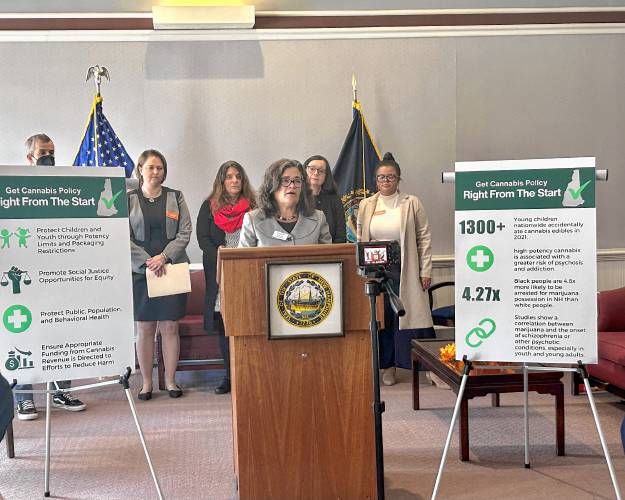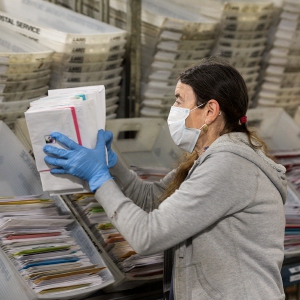Public health and social justice should be focus of NH marijuana legalization efforts, advocates say

Kate Frey, vice president of advocacy at New Futures with members of the Cannabis Policy Coalition for Public Health and Social Justice on Tuesday at a press conference SRUTHI GOPALAKRISHNAN—
| Published: 12-02-2023 2:53 AM |
If New Hampshire chooses to legalize recreational marijuana, the focal point should be redirecting revenue from marijuana sales toward public health and social justice programs, mental health and public policy advocates said.
“What we have to understand is that anytime you legalize an addictive product, you will always have increased harm,” said Kate Frey, vice president of advocacy at New Futures, a statewide nonprofit. “So our goal is to make sure that when those harms are raised, we as a state are prepared with resources.”
The Cannabis Policy Coalition for Public Health and Social Justice on Tuesday outlined key principles for regulating cannabis for safe use, including limiting its potency, using warning labels, providing educational resources on risks and prohibiting attractive packaging appealing to children and products like marijuana-infused beverages and edibles resembling candy or snacks.
However, the effectiveness of these regulations hinges on the passage of a bill that would legalize the recreational use of marijuana. Currently, the state has decriminalized possession of small quantities of marijuana and allows the sale of the drug for specific therapeutic reasons at licensed dispensaries.
The state commission tasked with recommending a way to legalize recreational marijuana use in 2024 faced challenges and couldn’t reach a consensus on a proposal after months of work. Instead, the commission submitted a report on Monday without a recommendation.
A day before the commission concluded its work, the governor’s office suggested some restrictions, including a limit of 15 stores that could sell cannabis products and a prohibition on lobbying and political contributions from any licensee if marijuana is legalized in New Hampshire.
Frank Knaack, a member of the coalition and policy director at ACLU New Hampshire, said the commission’s work was a “strong starting point” in efforts to legalize recreational marijuana.
“I think it’s really important to recognize that New Hampshire is not going from no marijuana to marijuana. We are going from an unregulated market to a regulated market,” Knaack said. “I think we’re all excited about the state-run model.”
Article continues after...
Yesterday's Most Read Articles
 Dartmouth administration faces fierce criticism over protest arrests
Dartmouth administration faces fierce criticism over protest arrests
 West Lebanon crash
West Lebanon crash
 Plan on track to ship Upper Valley mail to Connecticut for sorting
Plan on track to ship Upper Valley mail to Connecticut for sorting
 Lebanon’s Jewell back from auto accident, more aware of ‘drowsy driving’ dangers
Lebanon’s Jewell back from auto accident, more aware of ‘drowsy driving’ dangers
 Longtime employees buy West Lebanon pizzeria
Longtime employees buy West Lebanon pizzeria
The working proposal would pave the way for adults to purchase recreational cannabis from stores franchised by the New Hampshire Liquor Commission. With a 15% fee on retail outlets’ gross sales, this model would make New Hampshire the first state in the country to implement a state-run controlled retail model for marijuana.
In the New England region, New Hampshire stands alone as the only state yet to legalize marijuana for recreational use.
Learning from the experiences of other states, the coalition urges a cautious approach, highlighting the pitfalls of rushing into commercialization without prioritizing public health.
Addressing broader concerns, the coalition wanted to highlight the racial bias evident in New Hampshire’s current approach to marijuana enforcement.
Despite similar usage rates between Black and white individuals, Black people in New Hampshire are four times more likely to be arrested for marijuana possession compared to their white counterparts, said Knaack.
“From the core racial justice perspective, the enforcement of marijuana laws will have a tremendous impact from day one because it will not only stop these harmful cycles of arrest in New Hampshire but also stop the racial disparities that we’re seeing on a day-to-day basis in our cities and towns,” said Knaack.
Mental health organizations such as NAMI-NH and the New Hampshire Center for Behavioral Health Association take a nuanced stance. They neither support nor outright oppose legalizing recreational cannabis.
Cynthia Whitaker, president of the Greater Nashua Mental Health — one of the 10 community mental health centers — expressed concerns about the strain on mental health services.
She said she supports the coalition’s regulation principles but emphasized the need for warning labels and education about risks.

 Over Easy: On bread, buttered popcorn and big sandwiches
Over Easy: On bread, buttered popcorn and big sandwiches
